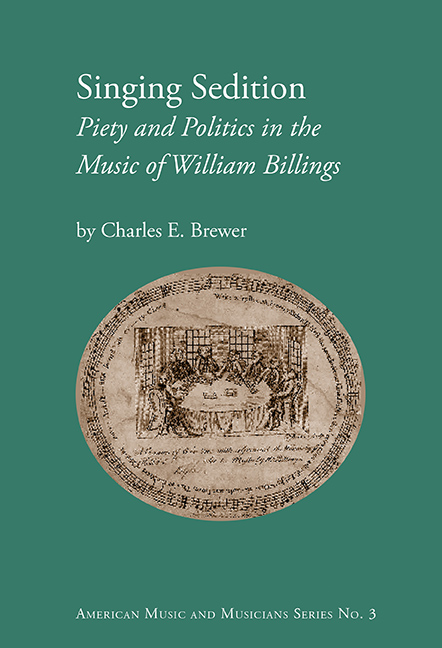Book contents
- Frontmatter
- Table of Contents
- List of Illustrations, Musical Examples, and Tables
- Prologue
- Acknowledgements
- Abbreviations
- Part I Rebellious Voices in Billings's Boston
- Part II Singing the Rebellion
- Chapter Three Shiloh and the Meanings of Christmas
- Chapter Four Billings's Anthems: Lamentation to Independence
- Chapter Five “Victory that Day was Turned into Mourning”
- Chapter Six “I Am the Rose of Sharon”: Rev. Samuel Cooper and William Billings
- Chapter Seven “Peace be on Earth, Good Will towards Men”
- Epilogue
- Appendices
- Bibliography
- Index
Chapter Three - Shiloh and the Meanings of Christmas
from Part II - Singing the Rebellion
- Frontmatter
- Table of Contents
- List of Illustrations, Musical Examples, and Tables
- Prologue
- Acknowledgements
- Abbreviations
- Part I Rebellious Voices in Billings's Boston
- Part II Singing the Rebellion
- Chapter Three Shiloh and the Meanings of Christmas
- Chapter Four Billings's Anthems: Lamentation to Independence
- Chapter Five “Victory that Day was Turned into Mourning”
- Chapter Six “I Am the Rose of Sharon”: Rev. Samuel Cooper and William Billings
- Chapter Seven “Peace be on Earth, Good Will towards Men”
- Epilogue
- Appendices
- Bibliography
- Index
Summary
One unexpected composition to include among Billings's other political works is his psalm-tune Shiloh, the opening composition in The Suffolk Harmony. Unusual among all the texts as published in his tunebooks, Shiloh is explicitly signed by Billings and it includes an extensive set of footnotes printed with the separate complete version of the text facing the psalm-tune itself.
In describing Billings's own text, McKay and Crawford point out the difficulty of dealing with the extensive annotations.
Some references support the text no more directly than, for example, Billings's dubious equation of the Shepherds’ peering into the manger at the baby Jesus with St. Paul's figurative “now we see through a glass, darkly.” Billings's documentation for Shiloh, however, is no spoof. Most of the scriptural references have some clear and demonstrable connection with the passages of the poem to which they are linked. And the footnotes do once more demonstrate Billings's knowledge of the Bible. The question that remains is why he went to all the trouble, and two answers can be suggested.
The solutions proposed by McKay and Crawford relate first of all to Billings's possible need to document the celebration of Christmas in the context of a Congregational society that throughout much of the seventeenth and eighteenth centuries actually opposed any celebration on 25 December. Their second proposed solution is that the documentation of Shiloh was Billings's response to the criticisms he had sustained as an editor of the Boston Magazine in 1783.
There is merit in both of these proposals, but there is also a strong third possibility that Shiloh is more than a simple Christmas carol.5 Though Shiloh is the only text in Billings's tunebooks with annotations, it is not the only text Billings published with biblical citations. They were also included in the broadside version of the text to his anthem Samuel the Priest gave up the Ghost, which was first sung at the funeral of Rev. Samuel Cooper on 2 January 1784, and later also published in The Suffolk Harmony. It would seem unlikely that Billings would have added annotations to “Samuel the Priest” and Shiloh just to demonstrate his own biblical erudition.
- Type
- Chapter
- Information
- Singing SeditionPiety and Politics in the Music of William Billings, pp. 61 - 92Publisher: Boydell & BrewerPrint publication year: 2017



